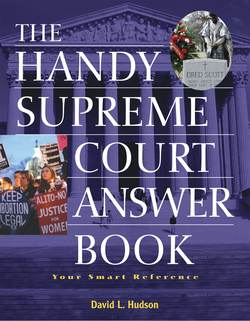Читать книгу The Handy Supreme Court Answer Book - David L Hudson - Страница 215
На сайте Литреса книга снята с продажи.
The Marshall Court struck down a state law for the first time in what decision?
ОглавлениеThe Marshall Court, by a vote of 4–1, invalidated a state law for the first time in Fletcher v. Peck (1810) in a case that involved questionable land deals. In 1795, the state of Georgia sold more than 30 million acres of land in the Yazoo area (located in present-day Alabama and Mississippi) to several Northern land companies. These companies in turn sold the land to third parties at much higher prices. It was revealed that many Georgia legislators received bribes for their votes in approving the land sales. In the next round of elections, these legislators were voted out of office and the new legislature passed a law in 1796 that annulled the original sale contracts.
This cancellation presented a problem for innocent third-parties who purchased the land without knowledge of the shady origins of how the land was first acquired. In what some think was a contrived lawsuit—many believe plaintiff and defendant planned the lawsuit together—Robert Fletcher of New Hampshire sued John Peck of Massachusetts in 1803 to “quiet,” or establish, his title to ensure that he had a valid claim to the land.
The Court ruled that the Georgia law invalidating the Yazoo land sales was unconstitutional because it violated the Constitution’s Contract Clause, preventing states from impairing the obligations of contracts. Chief Justice Marshall reasoned that the new law could negatively impact innocent, third-party purchasers, such as Fletcher. “If the original transaction was infected with fraud, these purchasers did not participate in it, and had no notice of it,” he wrote. “They were innocent.” Marshall ruled that Fletcher had “vested rights” in the land that he had innocently purchased.
CourtSpeak: Fletcher v. Peck Land Deal Case (1810)
Chief Justice John Marshall (majority): “When, then, a law is in its nature a contract, when absolute rights have vested under that contract, a repeal of the law cannot devest those rights; and the act of annulling them, if legitimate, is rendered so by a power applicable to the case of every individual in the community….
“Since, then, in fact, a grant is a contract executed, the obligation of which still continues, and since the Constitution uses the general term ‘contract’ without distinguishing between those which are executory and those which are executed, it must be construed to comprehend the latter as well as the former. A law annulling conveyances between individuals, and declaring that the grantors should stand seised of their former estates, notwithstanding those grants, would be as repugnant to the Constitution as a law discharging the vendors of property from the obligation of executing their contracts by conveyances. It would be strange if a contract to convey was secured by the Constitution, while an absolute conveyance remained unprotected.”
